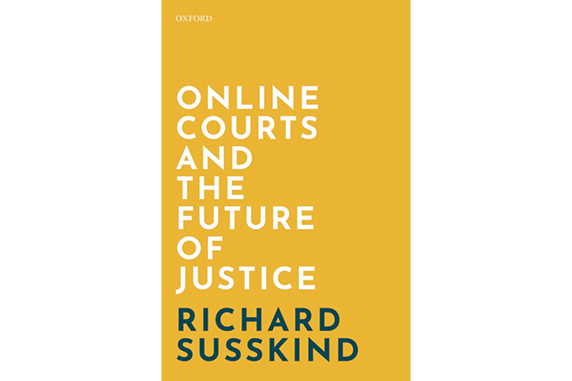For many people across the world, it is easier to find an internet connection than a lawyer. Could online courts revolutionise justice in 2020? Or is the legal profession not ready for trial by robot?
More people in the world now have access to the internet than access to justice. According to the Organisation for Economic Cooperation and Development (OECD), only 46 per cent of human beings live under the protection of the law, whereas more than 50 per cent of people are now active users of the internet in one way or another.
Annually, one billion people are said to need “basic justice care” but “in many countries, close to 30 per cent of problem-owners do not even take action”. As for public funding of legal and court services, it was found in a leading global study of legal aid, involving 106 countries, that around one-third “have not yet enacted specific legislation on legal aid” and that the “demand for legal aid in civil cases is largely unmet in most countries”.
Meanwhile, the courts of some jurisdictions are labouring under staggering backlogs – for example, 100 million cases in Brazil (as noted), and 30 million in India. Even in those legal systems that are described as “advanced”, court-systems are under-resourced, and the resolution of civil disputes invariably takes too long, costs too much, and the process is unintelligible to ordinary people. The broad case for change is self-evident – in varying degrees, the court systems of our world are inaccessible to the great majority of human beings.
There are two broad ways that change can be affected in a court system. The first is evolutionary and incremental, and involves improving the current system, in part by introducing new efficiencies and partly by securing greater state funding. By and large, this is the tack preferred by most judges and lawyers. Their refrain is that the basic system is well-tested and well-proven, there are clear opportunities for running a much tighter ship, and it is a scandal that today’s courts are so poorly resourced.
The second type of change to a court system is radical and requires the current set-up or great parts of it to be superseded swiftly rather than improved over time. If technologies are involved, they should bring transformation, rather than simply automating conventional processes. This view is shared by a growing number of activists, within and beyond the legal profession, who are arguing for radical change, claiming that today’s system is irretrievably broken or unfit for purpose.
To put my cards on the table, I am much nearer the radical end. I expect the transformation to be incremental and ongoing but I fall short of being a full-on, fully-bearded revolutionary.
During my first decade of working in technology in law, from the early 1980s to the early 1990s, online courts and online dispute resolution were in no-one’s contemplation, because the web had not yet been invented. In that period, people of a practical inclination spoke of, wrote of and developed systems in support of court administration while those interested in the future speculated, largely in the spirit of science fiction, about whether it might be possible for AI to replace judges and whether that might be a good thing.
“ I believe it is a privilege to be alive at this time of unprecedented change, at a time when young legal professionals, along with their senior colleagues, can play a central role in shaping tomorrow’s legal profession and court systems.” Richard Susskind
Now scarcely a day passes that we are assailed by news of some new innovation, technology, advance, breakthrough or app. Our systems are able to do more and more. In the practice of law, for example, often at a higher standard than junior lawyers, we now have systems that can draft documents, undertake due diligence work, isolate the most relevant documents from litigation bundles, predict the outcomes of deals and disputes, and offer legal guidance. And we now have more than 2,000 legal technology start-ups around the world (there were fewer than 200 but five years ago), many of which are focused precisely on extending the range of legal tasks that systems can take on. More generally, some entrepreneurs aspire to do to legal work what Amazon has done to bookselling.
We live in an age when we are greatly enhancing our capacity to process information. It is not outrageous to claim that the work of judges and courts is unlikely to emerge unscathed. Today’s courts were designed for a different epoch.
Commentators and practitioners often insist that much of the work of lawyers is beyond the reach of technology. They will suggest, for example, and not unreasonably, that the work of court lawyers cannot be replaced by machines. How could a robot possibly appear as an advocate before a judge?

The answer of course is that we are nowhere near this happening. But the story does not end here, as we are asking and answering the wrong question. Mistakenly, they are focusing on current ways of working rather than on whether the outcomes that court lawyers deliver might be achieved in very different ways.
Online courts are a different idea altogether. Online judging takes away much that many hold dear – the public hearing, the day in court, the direct interaction with other human beings. On the other hand, it is likely to make court service much more accessible and affordable and will chime with those who cannot recall a pre-internet world. The second sense of online court is more general. The idea here is that technology allows us to provide a service with a much wider remit than the traditional court. The additional services include tools to help users to understand their rights, duties, and options to them, facilities that assist litigants to marshal their evidence and formulate their arguments, and systems that advise on or bring about non-judicial settlement.
I accept that the radical change being brought by technology is unsettling and sometimes worse. Concerned parents and disillusioned students often ask me how I feel about a world in which the traditional work of lawyers and judges may be, as they see it, under siege. I take a different view. I believe it is a privilege to be alive at this time of unprecedented change, at a time when young legal professionals, along with their senior colleagues, can play a central role in shaping tomorrow’s legal profession and court systems. I go further and say it is the duty of all lawyers and judges to be involved.




